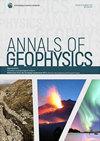解决数据、产品和服务可访问性的挑战:EPOS视角
IF 1.2
4区 地球科学
Q3 GEOCHEMISTRY & GEOPHYSICS
引用次数: 2
摘要
新的测量技术、额外的传感器和不断增加的数据处理能力为回答当前一些最紧迫的社会和环境问题提供了新的机会。它们还促成了可用数据量将继续增加的事实。与此同时,对提供这些数据的人的要求也在增加,用户访问这些数据的需求也在增加。EPOS交付框架旨在通过为广大用户提供支持多学科分析的数据、产品和服务,支持固体地球领域的这一努力。基于这个例子,我们着眼于最紧迫的问题,从何时使数据、产品和服务可访问,到访问原则,与收集和使用以及推广相关的道德问题。在许多特点中,我们揭示了一个共同的组成部分,它对所有领域都有同样的影响:变化。不仅数据、产品和服务的数量和类型会发生变化,而且社会期望和提供商的能力也会发生变化。本文章由计算机程序翻译,如有差异,请以英文原文为准。
Addressing the challenges of making data, products, and services accessible: an EPOS perspective
Novel measurement technologies, additional sensors and increasing data processing capacities offer new opportunities to answer some of the currently most pressing societal and environmental questions. They also contribute to the fact that the available data volume will continue to increase. At the same time, the requirements for those providing such data rise and the needs of users to access it. The EPOS Delivery Framework aims to support this endeavour in the solid Earth domain by providing access to data, products, and services supporting multidisciplinary analyses for a wide range of users. Based on this example, we look at the most pressing issues from when data, products, and services are made accessible, to access principles, ethical issues related to its collection and use as well as with respect to their promotion. Among many peculiarities, we shed light on a common component that affects all fields equally: change. Not only will the amount and type of data, products, and services change, but so will the societal expectations and providers capabilities.
求助全文
通过发布文献求助,成功后即可免费获取论文全文。
去求助
来源期刊

Annals of Geophysics
地学-地球化学与地球物理
CiteScore
2.40
自引率
0.00%
发文量
38
审稿时长
4-8 weeks
期刊介绍:
Annals of Geophysics is an international, peer-reviewed, open-access, online journal. Annals of Geophysics welcomes contributions on primary research on Seismology, Geodesy, Volcanology, Physics and Chemistry of the Earth, Oceanography and Climatology, Geomagnetism and Paleomagnetism, Geodynamics and Tectonophysics, Physics and Chemistry of the Atmosphere.
It provides:
-Open-access, freely accessible online (authors retain copyright)
-Fast publication times
-Peer review by expert, practicing researchers
-Free of charge publication
-Post-publication tools to indicate quality and impact
-Worldwide media coverage.
Annals of Geophysics is published by Istituto Nazionale di Geofisica e Vulcanologia (INGV), nonprofit public research institution.
 求助内容:
求助内容: 应助结果提醒方式:
应助结果提醒方式:


